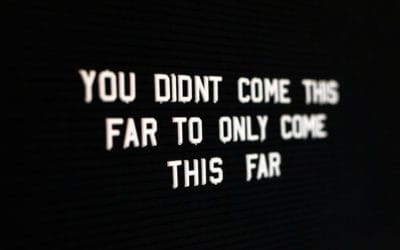A friend invited me to a dinner to meet his new girlfriend. I’d get to hang out with several other people from work and residency, too. So, I was looking forward to the dinner.
We all sat down to eat. About ten minutes into the meal, I felt and looked like I had just gotten out of a swimming pool. I was sweating. A lot. I thought to myself, “Why do these people keep their house so hot?” Then, I looked around and realized that no one else was sweating like me. Looking back, this is the first time I can remember that something was off.
Over the next twelve months, I started to have other symptoms. I was having GERD and daily headaches. My essential tremor was getting worse. My wife and I were getting into a lot of arguments, which was new for us; mainly because I was having a hard time controlling my anger.
I thought that much of what I was experiencing was related to stress or burnout at work. I started to resent my job. Some of my friends and family thought it was because I had too much on my plate. Yet, I had always managed to juggle all of the balls in the air without much difficulty.
I wasn’t sleeping. In fact, I hadn’t slept through the night more than 10-20 days in the last year. Each night, I’d wake up 3 or 4 times per night amped up and unable to fall back to sleep with ease. I chalked it up to stress. I was tired all of the time during the day.
When the Doctor Becomes the Patient
Soon after, I ran out of the propranolol I had been taking for my essential tremor. No big deal, though. I’d pick the prescription up later. I wasn’t performing any procedures that day. Instead, I’d be playing golf with one of my best friends. This was going to be an easy going day. Who cared if my hands shook?
The loser always owes the winner a beer. After the first hole, I was up by one stroke. I was off to a good start. We teed off on the next hole, and walked down for our next shot.
As my friend was hitting his second, a ball landed with a loud thump just past him, and right at my feet. The group behind us was standing on the tee box. They had driven their golf ball into us while we were in the fairway without yelling, “Fore!”. (This is a cardinal sin in the world of golf – getting hit by a driven golf ball can seriously injure you).
Suddenly, my heart started to race and my hands shook.
Turning to my friend, I said, “When they come down here, you have to handle this… I can’t control my emotions right now.“
With palpitations in my chest, I experienced the first panic attack of my life. Not having a personality that is prone to anxiety, this is when I put it all together. Something was wrong.
Fortunately, my family medicine doctor put it together before I did. The TSH she ordered the week prior ended up being undetectable (<0.1 mU/ml). Thank God for good primary care doctors! A few weeks later my endocrinologist diagnosed me with Grave’s Disease.
Doctors are Human, Too
My amazing endocrinologist, who was also my internal medicine clerkship director in medical school at Wake Forest, explained to me that Grave’s disease often presents itself in times of stress. It all made sense. The last 13 months had been very stressful after my wife started a full-time job while I was working 1.3 FTE at work.
Suddenly, I was dropping my kids off, picking them up, making dinner, doing dishes, folding laundry, and cleaning floors. I was happy to do all of this, of course, but it was a lot in addition to what I was already doing.
The year prior I was publishing randomized control trials, going to committee meetings, working more than I should, winning teaching awards, and taking care of very sick patients. Now that my home responsibilities had tripled, my work-life balance was off.
It was stressful.
There were a lot of things that I wanted to accomplish at work, but none of them compared to my desire to be a good husband and dad. Yet, I wasn’t doing a good job at home. It all added up. Then, my Grave’s disease reared it’s ugly head, which led me to feel burned out.
Burnout and Moral Injury Are Multifactorial
Work life, home life, and personal life don’t always play well together. When they don’t, it can lead to burnout.
Burnout has both systematic and individual causes. It is a mixture of systemic failures of the medical system, bad leadership, work-life imbalance issues, and a slew of other problems.
Over the past twelve months something has become clear to me. While our medical system is broken, doctors bring their individual problems to the table, too. These problems can impact our burnout at work. Particularly, when doctors don’t feel supported or well-known by those who make decisions about their job.
Your problem might be like mine (work load and medical in nature). It could be something else. You might be going through a divorce. Perhaps, you or a family member are dealing with substance abuse or alcoholism. Maybe you have experienced other difficulties that make it challenging to find the work-life balance that you seek.
The point is that burnout and moral injury are multifactorial.
The Solution
I break the answer to burnout, work-life imbalance, compassion fatigue, and moral injury into two distinct solutions.
The first category involves systemic solutions. These are often outside of our control. Ideally, medical leadership will start focusing on the systemic nature of the problem, just like the airline industry did when it solved their safety problems. The causes of burnout are many, but they do have systematic answers.
Second, doctors need to work towards financial independence so that they can provide a solution of their own. In the mean time, you may consider pursuing partial FIRE, locums tenens, or even changing jobs.
Take Home
It is our responsibility to fight for our desired work-life balance. We cannot depend on the system to fix itself. Instead, we must make sure we take care of our own financial freedom. That way, we can use financial independence as an escape hatch, if we ever need it.
This starts with gaining some basic financial literacy. With these tools, you can find the freedom you deserve regardless of how you found your current burnout, moral injury, or work-life imbalance.
In my situation, a combination of methimazole and partial FIRE (asking for less shifts after paying off all of our non-mortgage debt) has resulted in a vast improvement in my work-life balance, happiness, and relationships at home; even if my family still prefers the house to be much warmer than this Grave’s patient would prefer.
Are you burned out or morally injured? What led to your current situation? Did individual problems complicate your problems? Leave a comment below.





Doctors often make the worse patients and usually have a delay in diagnosis because of putting it off.
Glad to see you finally have an etiology to your symptoms which can be treated and hopefully you return back to baseline, or at least handle the stress level better with your increased responsibilities.
I can tell you that my divorce was the biggest impetus for my own burnout. Work was great because it was a distraction but adding to a full work schedule and then dealing with all the issues of a highly contentious divorce put a ton on my plate and much more than most could handle. A lot of colleagues were surprised I didn’t turn to medication during this period (I didn’t) but I could easily understand why some or most would.
Thanks, X-ray. I am happy to have an answer, too.
Now only if this methimazole would start working ?
Life outside of work has a way of impacting our work life, too. Glad you found your way out from that tunnel, and have been coragious enough to share your story!
Fifteen years on and I haven’t seen a doctor for all those symptoms I had as a result of Burnout. Some of them got better over time. Some of them I’m still ignoring! Doctor, heal theyself indeed…
We aren’t very good at it, are we?
Jimmy-
Physicians don’t take care of themselves all too often because we feel such a deep sense of obligation to take care of our patients, and we often to that to our own detriment. If we don’t take care of ourselves, we can’t take care of our patients. Thanks for reminding us of that. We forget that a lot. We need to be better at caring for ourselves as physicians.
-Brent
http://www.TheScopeofPractice.com
I am definitely not a very good patient. I also have a hard time finding out when I have the time to be a patient… Certainly part of the problem.
Graves has an interesting presentation for us endocrinologists. Patients typically arrive either untreated or soon after diagnosis, minimally treated. As in this situation, the symptoms predate the appreciation of what causes them. Since people become hyperactive, if they are not too sick, they can perform their work with great energy. It is not unusual for nursing aides to tell how they got a bonus for washing more patients than anyone else. Sometimes it is dysfunction, as in salesmen who won’t leave potential customers some slack time to ponder a big purchase. All are variants of the same disease but different severities and different pre-illness personal and professional obligations. All get treated. Most are grateful. A few wish they didn’t feel so dragged down after their lab work confirms they are normal
Yeah, I probably felt something like that at some point. Energized overachiever. That might have been an apt description of me a year and a half ago. It’s all changed since then.